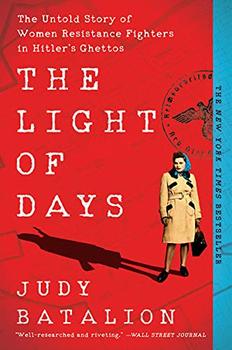Summary | Excerpt | Reviews | Beyond the Book | Readalikes | Genres & Themes | Author Bio

The Untold Story of Women Resistance Fighters in Hitler's Ghettos
by Judy Batalion
Centuries earlier, Jewish women were accorded "the right to know." The invention of the printing press led to a proliferation of Yiddish and Hebrew books for female readers; religious rulings allowed women to attend services; new synagogue architecture included a female annex. Now Jewish women were poets, novelists, journalists, traders, lawyers, doctors, and dentists. In universities, Jews made up a large percentage of the female students, enrolled in mainly humanities and science programs.
While the Zionist parties were certainly not "feminist"—women did not hold public office, for example—young women experienced a degree of parity in the socialist youth realm. One youth group, The Young Guard, to which Renia's older brother, Zvi, belonged, founded the idea of the "intimate group," with a dual leadership structure. Each section was led by a man and a woman. "Father" was the learning leader, and "Mother," the emotional leader; equally powerful, they complemented one another. In this family model, "their children" were like siblings.
These groups studied Karl Marx and Sigmund Freud, as well as female revolutionaries like Rosa Luxemburg and Emma Goldman. They explicitly advocated emotional discussion and analyses of interpersonal relationships. Members were primarily in their late teens, an age where many women were more mature than the men and, consequently, became organizers. Women led self-defense training; they were taught to be socially conscious, self-possessed, and strong. The Pioneer (Hechalutz) Union, the umbrella organization that included several Zionist youth groups and promoted agricultural training for pioneer life in Palestine, had an emergency plan B in case of conscription to the Polish army, which put exclusively women in charge. Countless photos of 1930s youth show women standing alongside men, dressed in similar dark coats and belts, or work clothes and pants; they too hold up scythes like trophies and grasp sickles like swords, preparing for lives of hard manual labor.
Sarah was a devoted Labor Zionist. Bela, the sister between her and Renia, joined Freedom too, and Zvi was fluent in Hebrew. Renia, too young to join, spent her early teens absorbing her siblings' passions, and one can picture her dropping in on meetings, sports games, and festivities—the little sister tagging along, taking it in, wide eyed.
In 1938 fourteen-year-old Renia was completing elementary school. A small group of Jewish students received general secondary education at the Coeducational District Secondary School in Jędrzejów, but she was not able to attend high school. In some accounts, Renia blamed this on antisemitism; in others, she explained that she needed to earn money instead of continuing her studies. Many young women's memoirs of the time speak of their ambitions to be nurses and even doctors, but perhaps Jędrzejów's more traditional setting, or Renia's urgent financial needs, made her seek out a secretarial career. She enrolled in a stenography course, hoping to set off on a life of office work. Little did she know that the work she was soon to take on would be of a rather different nature.
* * *
The youth groups all organized summer activities. In August 1939, young Labor Zionists gathered at camps and symposia where they danced and sang, studied and read, played sports, slept outdoors, and led countless seminars. They discussed the recent British white paper that had limited Jewish immigration to Palestine, and considered ways to relocate, desperate to carry on the work of their collective ideals, to save the world. The summer programs ended, and on September 1, the members were just settling back at home, undergoing the transition between the chosen family and the birth one, summer and school, green and ocher, warm breeze and chill, the country and the city.
Also, that was the day Hitler invaded Poland.
Excerpted from The Light of Days by Judy Batalion. Copyright © 2020 by Judy Batalion. Excerpted by permission of William Morrow. All rights reserved. No part of this excerpt may be reproduced or reprinted without permission in writing from the publisher.




Talent hits a target no one else can hit; Genius hits a target no one else can see.
Click Here to find out who said this, as well as discovering other famous literary quotes!
Your guide toexceptional books
BookBrowse seeks out and recommends the best in contemporary fiction and nonfiction—books that not only engage and entertain but also deepen our understanding of ourselves and the world around us.